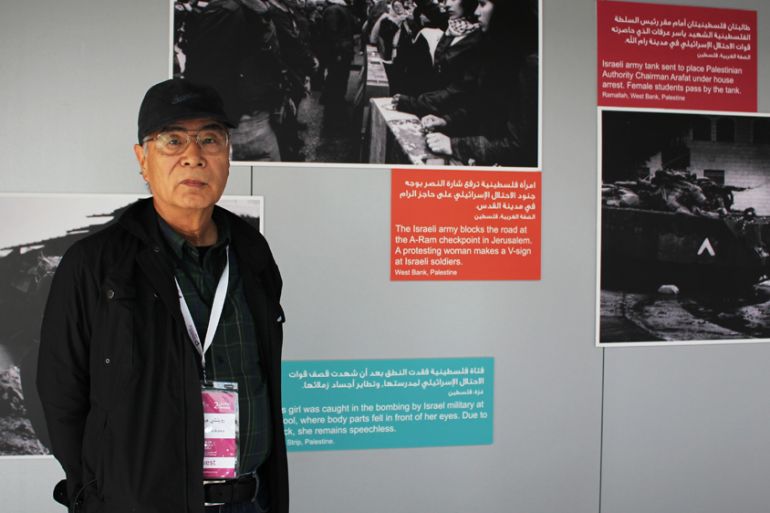Ryuichi Hirokawa: From kibbutz to Gaza
Veteran Japanese photographer Ryuichi Hirokawa says his work is inspired by the history of Palestine.

Standing before a photograph he took in 2009 of a Palestinian child in Gaza left speechless after witnessing a shower of human flesh from an Israeli attack on her neighbourhood, Japanese photographer Ryuichi Hirokawa says he decided to become a photojournalist because of Palestinians.
Hirokawa began taking pictures as a teenager, travelling through his native Japan to document local stories in the mountains and on isolated islands.
In 1967, after completing university, he travelled to Israel.
“I entered a kibbutz. In Japan they wrote that all kibbutzim were paradise,” he said, noting he arrived shortly before the outbreak of the Six-Day War. “I changed my mind. In Japan we were taught that war is bad, but people were celebrating.”
READ MORE: Nakba – The man reconstructing Palestine’s lost villages
Hirokawa, who made a recent appearance at the second International Palestinian Conference for Media and Communications in Turkey, recalled finding ruins near the kibbutz.
“I asked people what these ruins were but no one answered,” he said, noting as he began to explore and research the ruins further, he began to learn about the history of the Palestinian plight. “I started finding villages and I studied what happened. It took me more than 30 years, but I would take pictures and make documentaries about Palestinian villages.
“Palestinians made me a photojournalist.”
![Ryuichi Hirokawa has spent decades documenting Palestinian history [Photo of Ryuichi Hirokawa exhibit/Jehan Alfarra/Al Jazeera]](/wp-content/uploads/2016/05/3d73896d770e4f42afcc019ce3b51652_18.jpeg)
As he continued to study and learn more about Palestinian history, Hirokawa began to take part in demonstrations against the Israeli occupation, and “we had stones thrown at us”. He spent years tracking down the ruins of villages, finding them one by one, and then studying what had happened in each.
A Jewish friend helped him to track down the old villages by comparing modern-day and historical maps.
“I studied about what happened, why people left and so on. After that, I searched for people in refugee camps. It took 20, 30, more than 30 years. But I was able to take pictures and make a documentary about the Palestinian villages, almost 500 villages’ stories. It was a strong experience,” Hirokawa said.
My body said don't go, it's too dangerous. The refugee camp was closed by Israeli tanks but I started to enter. Immediately I found ... dead bodies.
In 1982, Hirokawa was in Lebanon at the time of the Sabra and Shatila massacre.
“When I was in Sabra and Shatila, it was the most difficult time for me,” he said. “There was an old man who kept asking me, ‘Why now you come? Why not before one month?’ … Then I understood that his son was killed one month before. He said, ‘If a journalist was there, the soldier couldn’t kill my son in front of a journalist.'”
The image of this grieving father pushed Hirokawa to enter Sabra and Shatila straight after the massacre.
“I remembered this person [telling me that] without journalists, something awful happens,” he said, noting he was initially fearful to enter. “My body said don’t go, it’s too dangerous. The refugee camp was closed by Israeli tanks but I started to enter. Immediately I found … dead bodies.”
Hirokawa remembers being in a state of shock as he witnessed the carnage inside the camp. At the time, he took pictures of dead bodies, but he wanted to go back to find out who they were. It was difficult to return in the immediate aftermath of the massacre, as the area was locked down, but a year later, Hirokawa went back. “I found the victim’s families and wrote their stories,” he said.
In another gesture of support to Palestinians, Hirokawa has set up the Japanese Committee for the Children of Palestine, a charity that allows for the sponsorship of orphans and raises funds to build kindergartens.
“People want to help,” he explained.
With a report from Jehan Alfarra